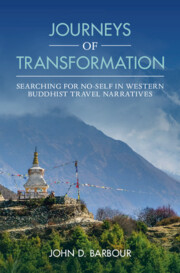Book contents
- Journeys of Transformation
- Reviews
- Journeys of Transformation
- Copyright page
- Dedication
- Contents
- Acknowledgments and Author’s Note
- Introduction A Literary Genre and Some Questions about Self-Transformation
- Chapter 1 The Origins of the Genre
- Chapter 2 Peter Matthiessen’s The Snow Leopard and Nine-Headed Dragon River
- Chapter 3 In a Zen Monastery
- Chapter 4 Thomas Merton and Christian and Jewish Pilgrims in Buddhist Asia
- Chapter 5 Walking the Dharma on Shikoku and in India
- Chapter 6 Trekking and Tracking the Self in Tibet
- Chapter 7 Life-Changing Travels in the Tibetan Diaspora
- Chapter 8 Encounters with Theravada Buddhism
- Chapter 9 Searching for Chan Buddhism after Mao
- Conclusion Theories of No-Self, Stories of Unselfing, and Transformation
- Bibliography
- Index
Introduction - A Literary Genre and Some Questions about Self-Transformation
Published online by Cambridge University Press: 12 March 2022
- Journeys of Transformation
- Reviews
- Journeys of Transformation
- Copyright page
- Dedication
- Contents
- Acknowledgments and Author’s Note
- Introduction A Literary Genre and Some Questions about Self-Transformation
- Chapter 1 The Origins of the Genre
- Chapter 2 Peter Matthiessen’s The Snow Leopard and Nine-Headed Dragon River
- Chapter 3 In a Zen Monastery
- Chapter 4 Thomas Merton and Christian and Jewish Pilgrims in Buddhist Asia
- Chapter 5 Walking the Dharma on Shikoku and in India
- Chapter 6 Trekking and Tracking the Self in Tibet
- Chapter 7 Life-Changing Travels in the Tibetan Diaspora
- Chapter 8 Encounters with Theravada Buddhism
- Chapter 9 Searching for Chan Buddhism after Mao
- Conclusion Theories of No-Self, Stories of Unselfing, and Transformation
- Bibliography
- Index
Summary
This Introduction explains the characteristics of Western Buddhist travel narratives as a genre and their value as a source of religious insight. These stories are autobiographical accounts of a journey to a Buddhist culture. They often describe a transformative religious experience, “unselfing,” when a person’s sense of self is radically altered. The Buddhist concept of no-self helps authors interpret this kind of experience, and it also provokes and enables such events. No-self is a challenging idea for Westerners trying to understand and reconcile it with their culture’s understanding of the self. Autobiographical accounts, in particular travel narratives, disclose crucial features of self-transformation and interpret the meaning of no-self in diverse ways and in contrast to theoretical and philosophical forms of discourse. The structure and topics of the book’s chapters are outlined.
Keywords
- Type
- Chapter
- Information
- Journeys of TransformationSearching for No-Self in Western Buddhist Travel Narratives, pp. 1 - 23Publisher: Cambridge University PressPrint publication year: 2022

